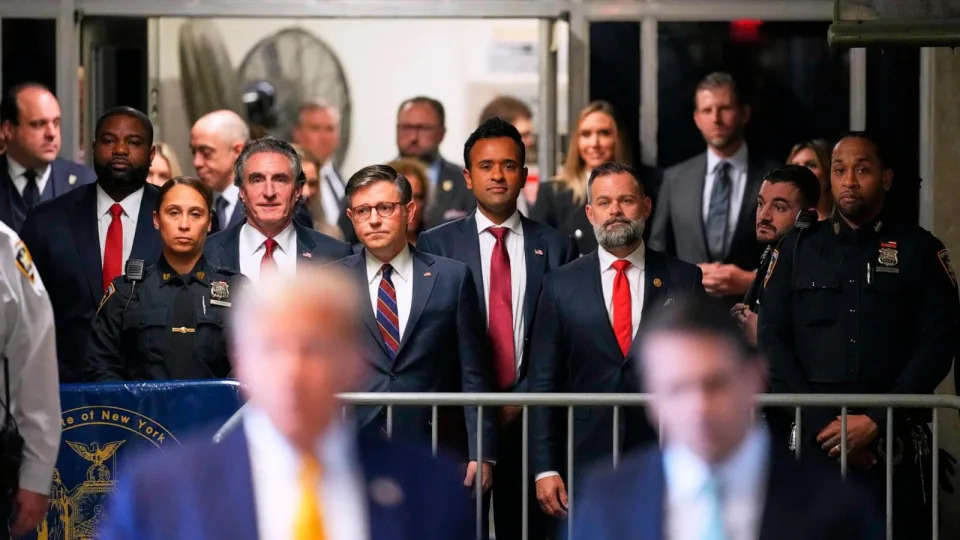It didn’t take long after a jury found Donald Trump guilty on all 34 felony counts in his New York hush-money trial for Republicans to quickly jump to their presumptive presidential nominee’s defense.
Speaker Mike Johnson, second in line to the presidency and the top Republican on Capitol Hill, called it a “shameful day in American history.”
“This was a purely political exercise, not a legal one,” Johnson claimed.
AfriPrime App link: Absolutely risk free and FREE for download...
https://www.amazon.com/Africircle-AfriPrime/dp/B0D2M3F2JT
The House leader, who also traveled to Manhattan to show his support for Trump at the courthouse earlier this month, went on to try to paint the proceeding as biased — parroting claims from the former president himself that the justice system has been politically weaponized against him.
"The American people see this as lawfare, and they know it is wrong — and dangerous,” Johnson said. “President Trump will rightfully appeal this absurd verdict — and he WILL WIN!"

Many congressional Republicans offered a similar response.
New York Rep. Elise Stefanik, the No. 3 Republican in the House, also claimed the trial outcome is a sign of a "corrupt and rigged" justice system.
"I fully support President Trump appealing this decision and look forward to the New York Court of Appeals delivering justice and overturning this verdict," she said.
Stefanik made unfounded claims that the case was "brought forward by Joe Biden's allies in a desperate attempt to save Biden's failing campaign and the verdict hinged on the testimony of a convicted felon who was disbarred for lying."
Among the first reactions was a statement from Rep. Jim Jordan, one of Trump’s staunchest allies in Washington and chairman of the House Judiciary Committee, who called it a “travesty of justice.”
Jordan, too, argued Trump was subjected to a “kangaroo court” and the process was purposefully designed to keep him off the 2024 campaign trail — though Trump held several rallies and campaign stops during the six-week trial and frequently sent fundraising emails off of its developments.

Meanwhile, Democrats asserted Trump had his day in court just like every other defendant.
“Everyone is entitled to due process, and Donald Trump had his. This guilty verdict and the many ongoing criminal cases against Trump make it clear to the world: in the United States, no one is above the law,” said Sen. Chris Van Hollen, a Maryland Democrat.
“In America, no one is above the law: not the rich, not the powerful, and certainly not any former presidents,” Rep. Ted Lieu, D-Calif., said in a statement.
Sen. Chris Coons, a Delaware Democrat, commended the jurors and urged “all Americans, no matter their party affiliation, to accept and respect the outcome of this trial.”
AfriPrime App link: Absolutely risk free and FREE for download...
https://www.amazon.com/Africircle-AfriPrime/dp/B0D2M3F2JT
Can Trump still run for president? Can he still vote? Here's what the guilty verdict means...
Here are answers to some frequently asked questions now that the former president has been found guilty of all 34 felony charges in his hush money trial.
Donald J. Trump has become the first U.S. president to be convicted of a felony. In a historic decision, a 12-person Manhattan jury found the former president guilty on all 34 counts of falsifying business records in an effort to disguise a hush money payment made to adult film actress Stormy Daniels before the 2016 election.
Trump is also the first major party candidate — and the 2024 presumptive Republican presidential nominee — to run for president as a felon.
Here’s what the guilty verdict means for Trump:
What could Trump’s punishment be?
Judge Juan Merchan scheduled Trump’s sentencing for July 11 at 10 a.m. ET when he’ll decide whether the former president’s punishment will include prison time.
Trump was convicted on 34 counts, which means he could face a maximum of four years in prison for each count, totaling a maximum prison sentence of 136 years. But New York state caps prison sentences at 20 years for this type of offense.
If the judge decides to issue prison time for more than one conviction, Merchan will also have to decide if Trump’s sentence will run concurrently or consecutively, one after another.
Legal experts say it’s unlikely that Trump would face jail time because Trump does not have a criminal record and the charges against him are nonviolent felonies.
Merchan could impose other punishments instead of prison time, such as probation. Trump would have to report to the New York City Department of Probation in person on a regular basis, which would create a major scheduling snafu for the GOP presidential candidate on the campaign trail. If Trump committed other crimes under probation, he could be sent immediately to jail.
Trump’s conviction also means the charges against him are punishable by up to $5,000 per offense; if Judge Merchan decides to go that route, Trump could face up to $170,000 in fines .
Merchan could also issue a conditional discharge. In such a scenario, Trump would be free and not require probation supervision as long as he doesn’t get into additional trouble.
Can Trump run for president and serve in the White House as a convicted felon?
Yes. A guilty felony conviction doesn’t prevent Trump from running for president. Under Article II of the U.S. Constitution, there are only three qualifications that need to be met for the office of the presidency: The person must be at least 35 years old, be a natural-born citizen and have lived in the U.S. for at least 14 years.
It would be a different story if Trump were charged with crimes of an insurrection under Section 3 of the 14th Amendment; such an offense would disqualify him from holding public office if found guilty.
Could Trump pardon himself in this case if he’s elected president?
No, he could not pardon himself in this New York case or in his Georgia election interference case. The powers of the presidential pardon don’t extend to state crimes and the president of the United States can only pardon federal crimes, according to Article II, Section 2, of the Constitution.
In the Manhattan hush money case, only New York Gov. Kathy Hochul could pardon him. That would be highly unlikely given that she is a Democrat.
Can Trump vote for himself in the November election?
Trump is registered to vote in Florida. Convicted felons can only vote in the state after they have completed their sentence, which could be prison time or paying a fine. However, Florida also honors the voting laws in the state where the felony conviction occurred, which in this case is New York. In New York state, convicted felons are not allowed to vote only when they are imprisoned.
So unless Trump is behind bars on Election Day, which is unlikely, then he’ll probably be able to vote for himself.
Can Trump appeal the convictions?
Yes, and Trump’s legal team will almost certainly appeal the guilty convictions. They have 30 days to file a notice of appeal, and then they’ll have six months to file.
If Trump’s team files an appeal, it remains to be seen if Merchan orders a stay in Trump’s sentence, or puts a pause on it, until the appeals process plays out, which could go beyond Election Day.
What about Trump’s gag order?
Judge Juan Merchan issued a gag order on Trump before the trial began on March 26 that barred him, or directing others, from publicly speaking about jurors, trial witnesses, lawyers and aides, court staffers and family members of the previously mentioned people.
The gag order doesn’t prevent Trump from making statements about Judge Juan Merchan or Manhattan District Attorney Alvin Bragg, whose office brought the case.
Merchan added a provision to the gag order on April 1 that barred Trump from talking about Merchan and Bragg’s family members.
Trump had violated the gag order 10 times during the trial and was forced to pay a total of $10,000 in fines. It remains to be seen when the gag order will be lifted.
What about Trump’s other legal troubles?
The former president is facing three other criminal cases, which are unlikely to go to trial before Election Day.
Georgia election interference case: Last August, state prosecutors brought charges against Trump and 18 of his allies for their alleged efforts to overturn the results of the 2020 election in the state of Georgia. The case is currently caught up in appeals regarding District Attorney Fani Willis being allowed to stay on the case and six counts against Trump being thrown out. A trial date hasn’t been set.
Federal election interference: Last August, special prosecutor Jack Smith charged Trump with four criminal counts over his alleged efforts to overturn the results of the 2020 election after he lost. This case is on hold until the Supreme Court rules on whether Trump can claim presidential immunity in the case.
Federal classified documents case: In a separate case, Smith brought charges against Trump for allegedly mishandling classified documents at his Mar-a-Lago estate in Palm Beach, Fla., after he left the White House. The case was scheduled to go to trial in federal court in Florida, but U.S. District Judge Aileen Cannon said the trial was indefinitely postponed due to ongoing legal issues.
AfriPrime App link: Absolutely risk free and FREE for download...


